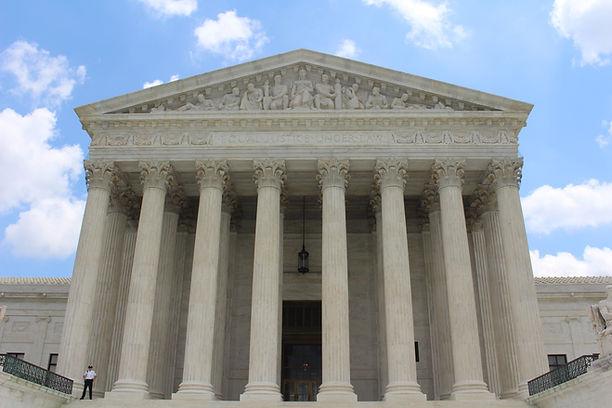
Noteworthy U.S. Supreme Court Cases
By looking at summaries of the following Supreme Court cases, you will see that we have made much progress in protecting the educational rights of children with disabilities. But more progress in protecting these rights clearly needs to be made.
Buck v. Bell, 274 U.S. 200 (1927)
This is a truly disturbing holding by the U.S. Supreme Court in which the Court affirmed the forced sterilization of a disabled woman with a history of disability in her family, stating that “three generations of imbeciles are enough.”

THE COURT MAKES GREAT LEAPS FORWARD
IN DEFINING A FAPE
Brown v. Board of Education, 347 U. S. 483 (1954)
Landmark United States Supreme Court case in which the Court found state laws establishing segregated public schools for black and white students to be unconstitutional.
Board of Ed. of Hendrick Hudson Central School Dist. v. Rowley, 458 U.S. 176 (1982)
The case defined free appropriate public education, "FAPE".
Irving Independent Sch. Dist. v. Amber Tatro, 468 U.S. 883 (1984)
The Supreme Court found that a medical treatment, such as clean intermittent catheterization, is a related service and schools are required to provide it.
Burlington Sch. Committee v. Mass. Bd. of Ed., 471 U. S. 359 (1985)
This decision clarifies procedural safeguards, parent role in educational decision-making, tuition reimbursement for private placement, and a child's placement during dispute about FAPE.
Cleburne v. Cleburne Living Ctr., 473 U.S. 432 (1985)
In this case, Justice Thurgood Marshall reflected on the history of discrimination against people with disabilities and noted its similarities to our nation’s ugly history of discrimination against racial minorities: “[People with disabilities] have been subject to a ‘lengthy and tragic history’…of segregation and discrimination that can only be called grotesque….A regime of state-mandated segregation and degradation…in its virulence and bigotry rivaled, and indeed paralleled, the worst excesses of Jim Crow.”
THE COURT CONTINUES TO MAKE GREAT LEAPS FORWARD IN IDENTIFYING PARENT AND STUDENT RIGHTS
Honig v. Doe, 484 U.S. 305 (1988)
The Supreme Court ruled that the "stay-put" provision prohibits state or local school authorities from unilaterally excluding disabled children from the classroom for dangerous or disruptive conduct growing out of their disabilities. Schools still have a responsibility to the student during the time of suspension. Schools cannot expel children for behaviors related to their handicaps.
Florence Co. Sch Dist Four v. Shannon Carter, 510 U.S. 7 (1993)
The Supreme Court found that if the public school fails to provide an appropriate education and the child receives an appropriate education in a private placement, the parents are entitled to be reimbursed for the child's education, even if the private school does not comply with state standards.
Cedar Rapids v. Garret F., 526 U.S. 66 (1999)
The Court held that the related services provision in the Individuals with Disabilities Education Act (IDEA) requires the provision of certain supportive services for a ventilator-dependent child despite arguments from the school district concerning the costs of the services.
Schaffer v. Weast, 546 U.S. 49 (2005)
The Supreme Court held that the burden of proof in a due process hearing that challenges an IEP is placed upon the party seeking relief.
DID THE COURT MADE A WRONG TURN?
Arlington Central Sch. Dist. Bd of Ed. v. Pearl and Theodore Murphy, 548 U.S. 291 (2006)
The Supreme Court ruled that IDEA does not authorize the payment of the experts' fees of the prevailing parents. This ruling made it difficult for low-income parents to win a due process case because they cannot afford to pay expert witness fees.
THE SUPREME COURT CONTINUES TO DEFINE THE RIGHTS OF STUDENTS AND PARENTS UNDER THE IDEA
Winkelman v. Parma City School District (No. 05-983) 550 U.S. 556 (2007)
The Supreme Court held that parents may pursue IDEA claims on their own behalf. This right is independent of their child’s rights.
Fitzgerald v. Barnstable School Comm., 504 F. 3d 165 (2009)
United States Supreme Court held that parents could sue a school committee under grounds of the Equal Protection Clause of the 14th Amendment.
Forest Grove School District v. T.A., 129 S.Ct. 2484 (2009)
The Court held that the Individuals with Disabilities Education Act (IDEA) authorizes reimbursement for private special education services when a public school fails to provide a "free appropriate public education" (FAPE) and the private school placement is appropriate, regardless of whether the child previously received special education services through the public school.
Safford Unified School District v. Redding, 557 U.S. 364 (2009)
The Supreme Court held that a strip search of a middle schooler violated the Fourth Amendment to the United States Constitution where the school lacked reasons to suspect either that the drugs (Ibuprofen) presented a danger or that they were concealed in her underwear. The court also held, however, that because this was not clearly established law prior to the court's decision, the officials involved were shielded from liability by qualified immunity.
J. D. B. v. North Carolina, No. 09-11121 (2011)
The Supreme Court of the United States held that age is relevant when determining police custody for Miranda purposes.
Endrew F. ex rel. Joseph F. v. Douglas County School Dist. RE-137 S.Ct. 988 197 (2017)
The Supreme Court, Chief Justice Roberts, held that to meet its substantive obligation under the IDEA, a school must offer an individual education plan (IEP) reasonably calculated to enable a child to make progress appropriate in light of the child's circumstances.